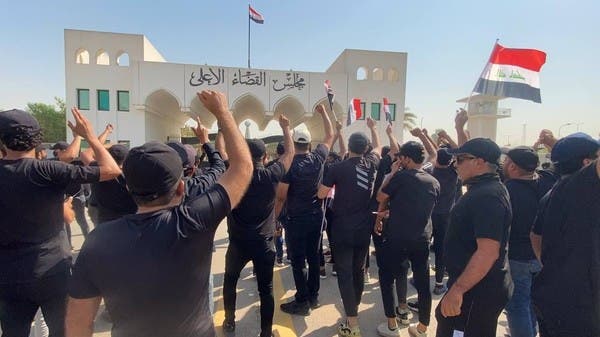An Iraqi security source told Al-Arabiya and Al-Hadath today, Tuesday, by announcing a state of alert (C) for the Iraqi security forces in the nation’s capital, Baghdad, after supporters of the Sadrist movement protested in front of the Supreme Judicial Council and Prime Minister Mustafa Al-Kazemi cut short his trip to Egypt.
According to the source, all military installations in Baghdad’s capital city and its entrances are in a state of alert, and any military convoys are not allowed to enter without the higher command’s permission.
The Supreme Judicial Council, on the other hand, made the decision to restart court operations as of tomorrow, Wednesday, while emphasising that individuals who interfere with public institutions will face legal repercussions.
In the meantime, Iraq’s Supreme Judicial Council chief reaffirmed the freedom to protest so long as institutions are respected.
For his side, Muhammad Salih al-Iraqi, a figure close to the head of the Sadrist movement in Iraq, urged the organization’s supporters to leave the Supreme Judicial Council but insisted they preserve the tents they had erected.
In addition to calling for the continuation of the sit-in in the Iraqi parliament, the leader known as Minister of Al-Sadr demanded the firing of the corrupt, their accountability, the return of the stolen monies, and the dismissal of the Public Prosecution.
Following the crisis between the Supreme Judicial Council and supporters of the Sadrist movement, appeals for calm in Iraq began to grow. On Tuesday, people came to the Federal Court’s headquarters in the heart of Baghdad to pitch up tents and announce an open sit-in.
In response to these events, Prime Minister Mustafa Al-Kazemi, who had to cut short his trip to Egypt, pleaded with all parties to remain calm.
He urged an immediate gathering of the political forces to launch the dialogue, emphasising that upsetting the legal system puts the nation in jeopardy.
While noting out that the freedom to demonstrate is protected by the constitution and highlighting the need to respect state institutions, he also emphasised the significance of igniting the national debate and ending the crisis.
In response, Iraqi President Barham Salih emphasised in a statement the necessity of safeguarding the legal system, emphasising that interfering with its operations poses a major threat to the nation.
Muhammad al-Halbousi, the Speaker of the Iraqi Parliament, stated in a tweet on his Twitter account that he supports the sit-ins but emphasised the need to avoid using the conflict against the country’s judicial system.
He also made it clear that he supports the right to demonstrate within the bounds of the law, but he said that the problem shouldn’t be resolved through the court system, which is the default option in cases of conflict.
The UN mission in the nation, for its part, emphasised the right to peaceful protest and emphasised how crucial it is to democracy.
She also made a point about the necessity of respecting government institutions.
Additionally, she stated in a tweet posted to her Twitter account that all institutions of the state, including the Judicial Council, must operate freely in the interests of the populace.
The Sadrists may have been enraged by the Iraqi judiciary’s prior declaration that it lacks the legal authority to dissolve Parliament and that the constitution lays out the requirements for doing so.
It is noteworthy that Iraq has been experiencing a serious political crisis for more than ten months due to the political forces’ inability to come to an agreement on the election of the republic’s president, the formation of a cabinet, and a deadlock in their respective stances.
announcing the Baghdad security warning and the start of court operations tomorrow

